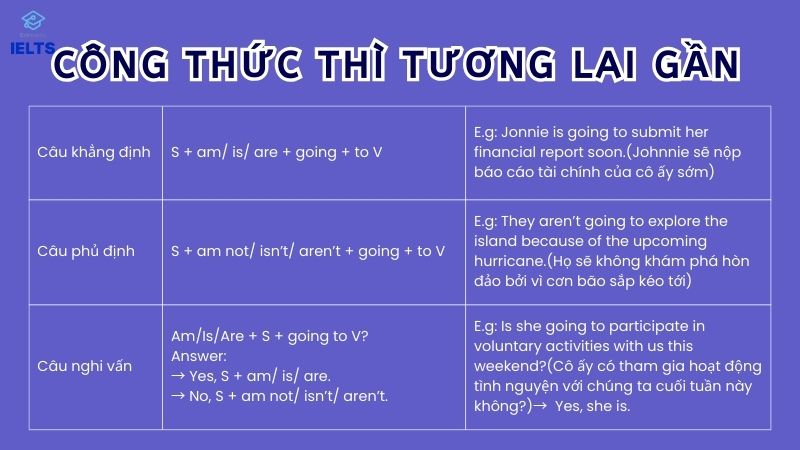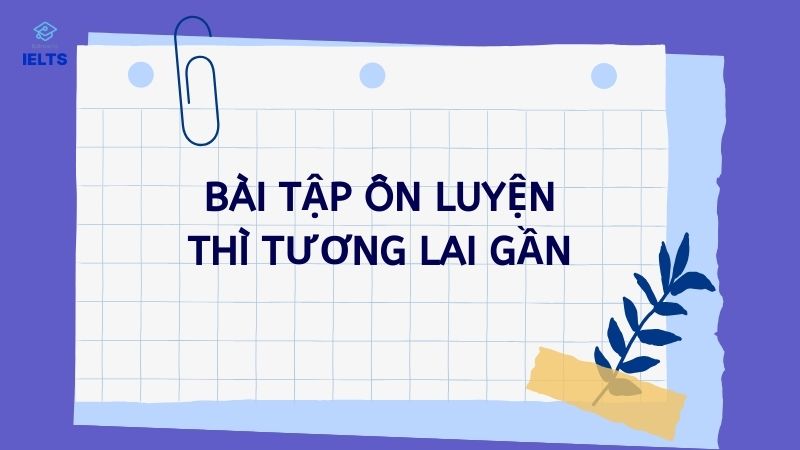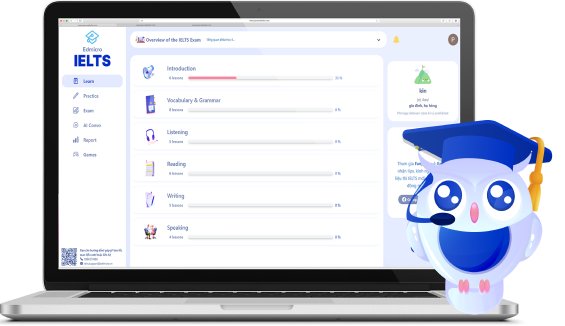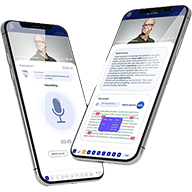Thì tương lai gần là một thì thông dụng trong tiếng Anh. Trong bài viết này, Edmicro sẽ giới thiệu lý thuyết thì tương lai gần. Sau đó bạn có thể thực hành với các bài tập bên dưới.
Cách dùng thì tương lai gần
Thì tương lai gần (Near future tense) được dùng để:
- Dùng để diễn tả một sự việc, hành động trong tương lai đã được lên kế hoạch hoặc dự định từ trước.
E.g: I am going to learn how to play the guitar this summer (Tôi sẽ học chơi guitar vào mùa hè này.)
- Dùng để diễn tả một dự đoán có căn cứ cụ thể.
E.g: Because of the war, the price of gas is going to rise in the coming weeks (Vì chiến tranh, giá gas sẽ tăng trong những tuần tới).
Công thức
Sau đây, Edmciro giới thiệu cấu trúc thì tương lai gần ở 3 thể: khẳng định, phủ định và nghi vấn.
Xem thêm: Bài Tập Ngữ Pháp Tiếng Anh: Dạng Bài, Cách Làm & Bài Tập

Dấu hiệu nhận biết
Bạn có thể xác định thì tương lai gần qua các từ và cụm từ chỉ thời gian trong câu như sau:
- in + khoảng thời gian (in 2 weeks: trong 2 tuần nữa)
- tomorrow
- Next week/ next month/ next year….
- Câu mệnh lệnh: Look!, Watch out!,…
Phân biệt thì tương lai gần và tương lai đơn
Nhiều người học dễ nhầm lẫn hai thì này, đặc biệt khi nói về dự đoán hoặc kế hoạch. Bảng dưới đây sẽ giúp bạn phân biệt rõ ràng giữa chúng để sử dụng chính xác trong từng ngữ cảnh.
| Tiêu chí | Tương Lai Đơn (will) | Tương Lai Gần (be going to) |
|---|---|---|
| Công thức | S + will + V (nguyên mẫu) | S + be (am/is/are) + going to + V |
| Ý định | Quyết định ngay tại thời điểm nói | Kế hoạch/dự định đã có trước khi nói |
| Dự đoán | Dựa vào ý kiến cá nhân, cảm nhận, không có bằng chứng rõ ràng | Dựa vào bằng chứng thực tế, hiện tại |
| Mức độ chắc chắn | Thường thấp hơn | Thường cao hơn |
| Tình huống dùng phổ biến | Quyết định tức thời Lời hứa, lời đề nghị, đe dọa Sự kiện tất yếu | Nói về kế hoạch đã sắp xếp Dự đoán dựa vào dấu hiệu hiện tại |
| Ví dụ | A: I’m thirsty. B: I will get you some water. I think she will pass the exam. | I’m going to visit my grandparents next weekend. Look! It’s going to rain. |
Bài tập ôn luyện thì tương lai gần
Dựa vào công thức và dấu hiệu thì tương lai gần, hãy hoàn thành bài tập sau.
Xem thêm: Ngữ Pháp Tiếng Anh: Những Chủ Điểm Quan Trọng + Tài Liệu Ôn Luyện

Exercise 1: Mark the letter A, B, C, or D on your answer sheet to indicate the correct answer to the following question.
- In the future, natural disasters (predict)_________ accurately with the help of technology.
- A. had been predicted
- B. are predicted
- C. have been predicted
- D. will be predicted
- If we go to Paris, we ______ lots of pictures.
- A. taking
- B. will take
- C. would take
- D. taken
- The man has saved enough money and he ______ a new apartment next month.
- A. will buy
- B. is going to be bought
- C. is going to buy
- D. will be bought
- – What are your plans for Father’s Day?
– I ______ visit my beloved father for a few days. I want to play golf with him.
- A. will
- B. is going to
- C. am going to
- D. won’t
- My friend ______ me a book when I finish cleaning the fridge.
- A. is going to give
- B. would give
- C. will give
- D. are giving
- I ______ a look at it as soon as I’ve finished what I’m doing.
A. would take
B. am taking
C. will take
D. was taken
- If you revise for the exam , I’m sure you ______ a good result.
A. have got
B. would get
C. will get
D. won’t get
- That’s the phone. I ______ it.
A. will answer
B. am answering
C. am going to answer
D. answered
- When we get home, we ___________ dinner.
A. will have
B. have
C. are having
D. had
- What are your plans for this evening? – I ________ my friends and then go to a birthday party.
A. have met
B. am going to meet
C. would be meeting
D. will be meeting
- She ______ the fatal disease while she was on her holiday to some Asian countries, including China.
A. communicated
B. approached
C. contracted
D. contacted
- About three million people ______ from the disease in the next twenty months if no measure is taken.
A. are going to suffer
B. is going to suffer
C. will be suffered
D. will suffer
- On this day next month, the conference on the new Corona virus ______ in Wuhan, which is one of the largest cities in China.
A. is holding
B. will hold
C. is held
D. will be held
- There is a terrible traffic jam and you ______ late for the reunion party.
A. is going
B. is going to be
C. will be
D. are going to be
- – What are your plans for Father’s Day?
– I ______ visit my beloved father for a few days. I want to play golf with him.
A. am going to
B. is going to
C. will
D. won’t
ĐÁP ÁN:
- D
- B
- C
- C
- C
- C
- C
- A
- A
- B
- C
- D
- D
- D
- D
Exercise 2: Rearrange the words to complete sentences.
- are/ They/ a/ going/ start/ to/ together/ new/ business.
- going/ learn/ to/ play/ this/ the guitar/ to/ how/ year/ am/ I.
- visit/ grandparents/ weekend/ on/ the/ our/ are/ We/ to/ going.
- next/ a/ car/ month/ He/ going/ to/ is/ new/ buy.
- company/ The/ new/ soon/ a/ product/ going/ launch/ is/ to.
- city/ work/ a/ new/ are/ going/ They/ move/ for/ to/ to.
- a/ next/ conference/ is/ to/ attend/ going/ She/ month.
- celebrate/ are/ to/ anniversary/ restaurant/ a/ at/ our/ We/ going/ fancy
ĐÁP ÁN
- They are going to start a new business together.
- I am going to learn how to play the guitar this year.
- We are going to visit our grandparents on the weekend.
- He is going to buy a new car next month.
- The company is going to launch a new product soon.
- They are going to move to a new city for work.
- She is going to attend a conference next month.
- We are going to celebrate our anniversary at a fancy restaurant.
Thì tương lai gần là một thì không quá khó nhưng cần phân biệt để tránh sử dụng nhầm lẫn với các thì tương lai khác. Edmicro hy vọng từ những kiến thức đã được cung cấp bạn có thể áp dụng và hoàn thành tốt các bài tập về thì tương lai gần.
Xem thêm:











